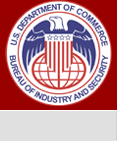Where Industry and Security Intersect
What's New | Sitemap | Search


During their November 2001 meeting in Washington D.C., Prime Minister Vajpayee and President Bush affirmed their commitment to qualitatively transform India-U.S. relations. They further agreed that the two sides should discuss ways to stimulate bilateral high technology commerce as a step toward enhancing the new relationship between the United States and India.
In pursuit of this goal, the Governments of the United States and India decided in November 2002 to work expeditiously toward developing a new statement of principles regarding bilateral cooperation in high technology trade, including trade in “dual-use” goods and technologies, in a way that broadly advances the relationship between the two countries in this area and reinforces their mutual interest in stemming the proliferation of sensitive goods and technologies.
The two Governments have set forth the principles to further promote and facilitate bilateral high technology commerce in its broadest sense:
1. The two Governments note that there is immense untapped potential for India-U.S. high technology commerce and recognise the importance of taking steps to remove systemic tariff and non-tariff barriers, identify and generate awareness of market opportunities, and build additional confidence in the two countries for such trade, in a way that reflects their new relationship and common strategic interests.
2. The two Governments recognize that the private sectors in India and the United States are important partners in this endeavour.
3. The two Governments should focus on steps to create the appropriate environment for successful high technology commerce. The Government of India appreciates the importance that the Government of the United States attaches to a supportive regulatory and institutional environment in India for robust bilateral high technology commerce, including easing barriers to such commerce. The Government of India intends to do its utmost in this regard.
4. The two Governments should seek to identify market opportunities in high technology commerce and related regulations that affect such commerce.
5. The two Governments, in partnership with the private sector, should consider steps for trade promotion efforts to generate awareness about market potential, relevant regulatory issues, collaboration opportunities, and financing possibilities.
6. The two Governments understand the importance of enhancing trade between India and the United States in “dual-use” items, including controlled “dual use” goods and technologies, while protecting the national security and foreign policy interests of both countries, and intend to take steps to facilitate such trade, which is a component of high technology commerce.
7. The two Governments should encourage outreach and educational activities to ensure that the private sectors in India and the United States have full and accurate information regarding the export control laws, regulations, and policies of the two countries.
8. The two Governments attach the highest importance to preventing the proliferation of sensitive goods and technologies. They further recognise the importance of continuing their export control cooperation programme and activities to achieve the shared goal of strengthening export control systems through laws, regulations, and enforcement, in accordance with modern export control standards.
9. The Government of the United States appreciates the importance that the Government of India attaches to the widest possible access to U.S. “dual-use” goods and technologies and to efficiency, continuity, stability, and transparency in the export license application process. The Government of the United States intends to do its utmost in this regard, consistent with its laws and national security and foreign policy objectives, including compliance with international commitments.
10. The two Governments recognize that U.S. “dual-use” export controls currently apply to only a very small fraction of total U.S.-India high technology commerce, and that a broad range of “dual-use” goods and technologies is currently available to India.
11. The Government of the United States should seek to identify and review licensing processes and policies for exports to India of goods and technologies controlled for reasons of anti-terrorism (AT), crime control (CC), encryption (EI), national security (NS), regional stability (RS), and short supply (SS), in a manner that seeks to facilitate further trade in these “dual-use” goods and technologies.
12. For authorized transfers of “dual-use” goods and technologies controlled for missile technology or nuclear proliferation reasons, including exports to entities in civilian space and civilian nuclear energy fields, the Government of India will consider a mutually satisfactory system of assurances regarding end use, diversion, transfers and retransfers within and outside India, re-export, and, where necessary, physical protection and access to the controlled items by third parties.
13. The two Governments should examine cooperative steps to ensure that all parties adhere to license conditions for “dual-use” goods and technologies and should outline the manner in which suspected violations and infractions are to be addressed. The Government of India will cooperate with the Government of the United States in verifying Indian end users and end uses.
14. The two Governments should seek to keep each other informed about changes in their export control laws, regulations, and policies; exchange information on export licences that are approved, denied, or returned without action; and establish a mechanism for prompt discussion of any bilateral “dual-use” export control issues.
15. This Statement of Principles constitutes the basis for further steps to enhance high technology commerce between the two countries.
16. The two Governments plan to convene as soon as possible the India-U.S. High Technology Cooperation Group (HTCG), decided upon in November 2002, to further this Statement of Principles and develop a schedule of meetings and activities for this purpose.
|
Kenneth I. Juster |
Kanwal Sibal |
February 5, 2003
Washington, D.C.
http://www.bxa.doc.gov/InternationalPrograms/StatementPrinciplesIndia.htm